Historical Overview of British Colonialism: A Comprehensive Analysis
VerifiedAdded on 2023/03/23
|18
|5079
|82
Essay
AI Summary
This essay presents a comprehensive historical overview of British colonialism, tracing its evolution from the medieval period through the 17th and 18th centuries. It defines British colonialism, explores the motivations behind its establishment, including the desire for territorial expansion, resource control, and the perceived superiority of the colonizers. The essay analyzes the characteristics of British colonial policies, such as the exploitation of resources and the imposition of cultural control. It further discusses the historical phases of the British Empire, from its early explorations to the rise of the Second British Empire and the subsequent imperial century, highlighting key events and shifts in policy. The essay concludes with a brief mention of the decolonization process in the Middle East, offering a detailed examination of British colonial rule and its lasting impact on the world.
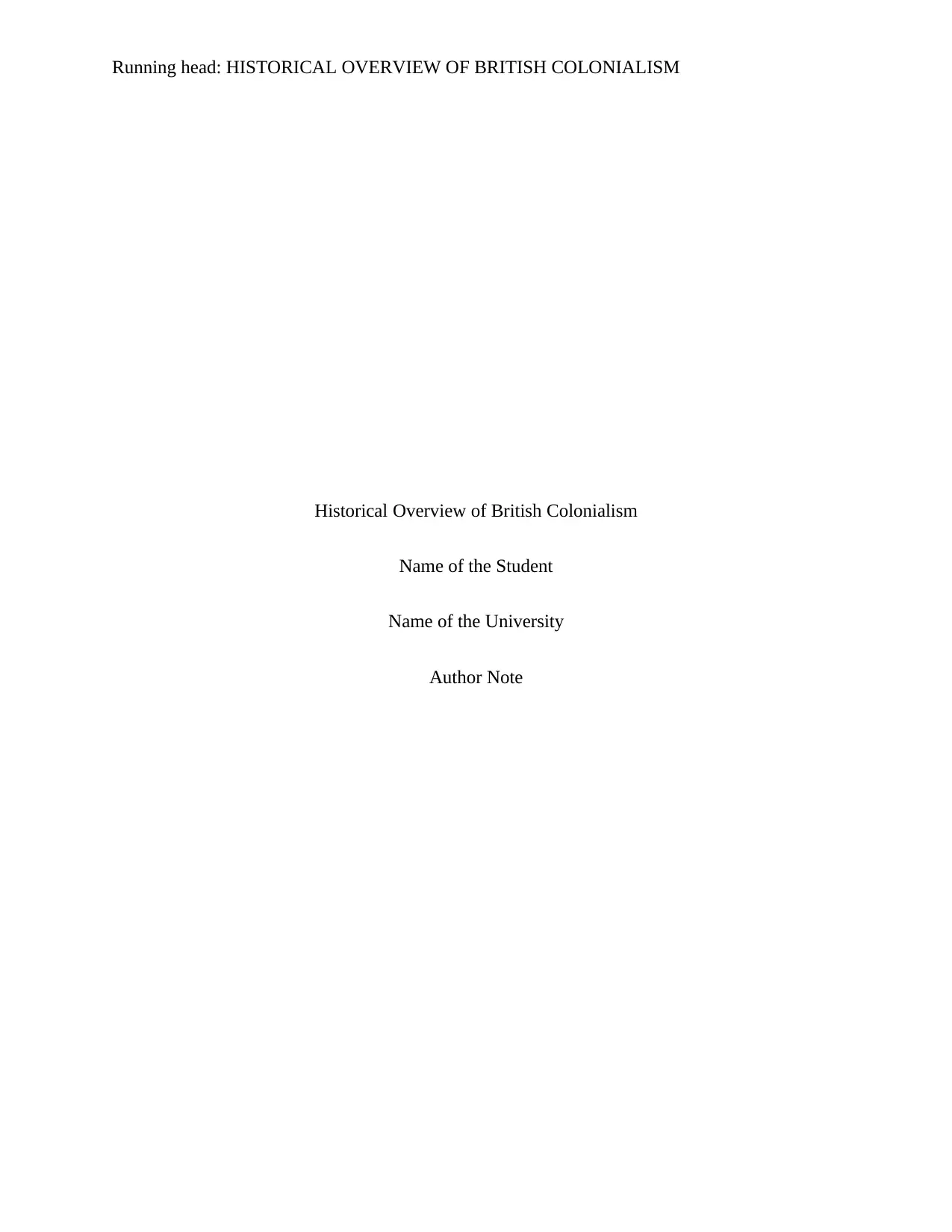
Running head: HISTORICAL OVERVIEW OF BRITISH COLONIALISM
Historical Overview of British Colonialism
Name of the Student
Name of the University
Author Note
Historical Overview of British Colonialism
Name of the Student
Name of the University
Author Note
Paraphrase This Document
Need a fresh take? Get an instant paraphrase of this document with our AI Paraphraser
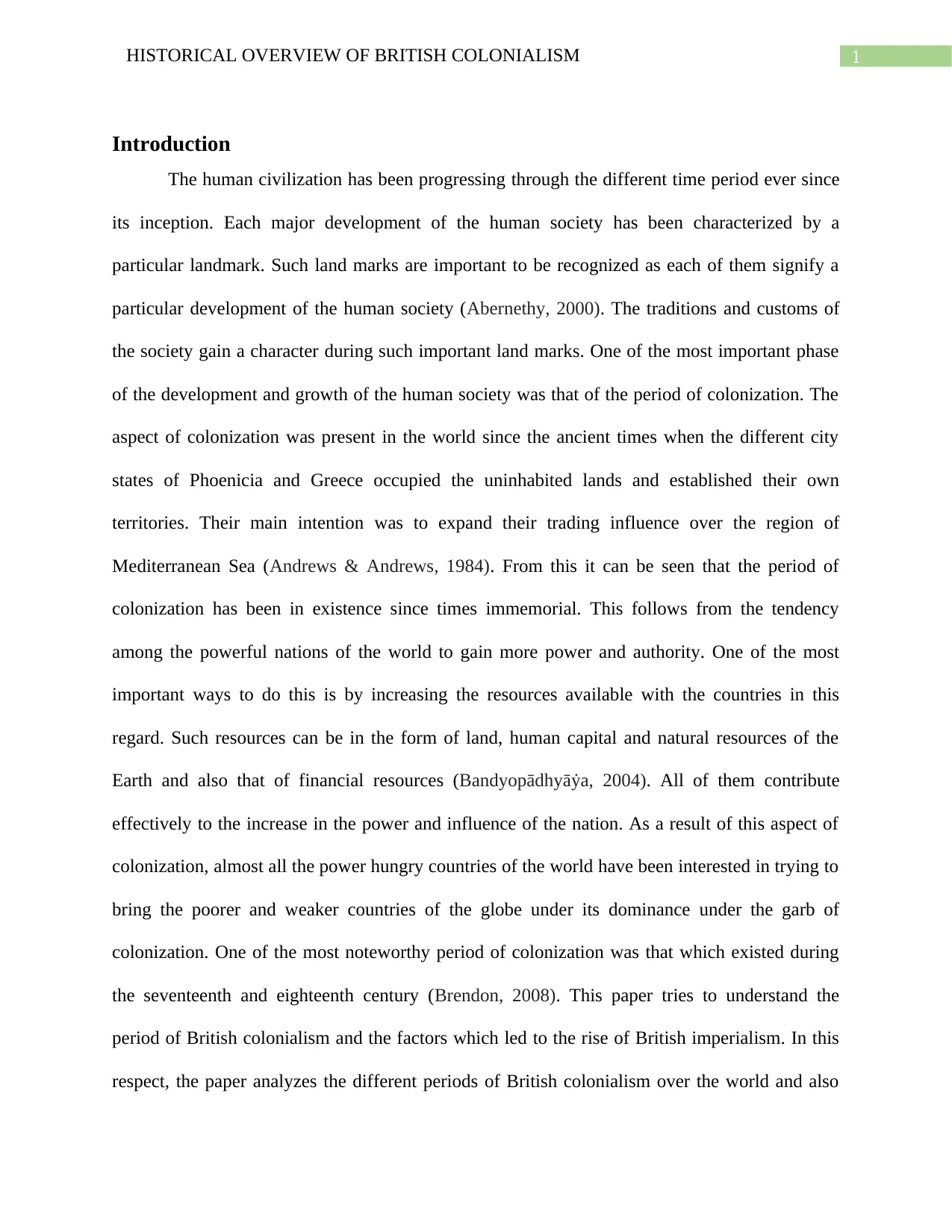
1HISTORICAL OVERVIEW OF BRITISH COLONIALISM
Introduction
The human civilization has been progressing through the different time period ever since
its inception. Each major development of the human society has been characterized by a
particular landmark. Such land marks are important to be recognized as each of them signify a
particular development of the human society (Abernethy, 2000). The traditions and customs of
the society gain a character during such important land marks. One of the most important phase
of the development and growth of the human society was that of the period of colonization. The
aspect of colonization was present in the world since the ancient times when the different city
states of Phoenicia and Greece occupied the uninhabited lands and established their own
territories. Their main intention was to expand their trading influence over the region of
Mediterranean Sea (Andrews & Andrews, 1984). From this it can be seen that the period of
colonization has been in existence since times immemorial. This follows from the tendency
among the powerful nations of the world to gain more power and authority. One of the most
important ways to do this is by increasing the resources available with the countries in this
regard. Such resources can be in the form of land, human capital and natural resources of the
Earth and also that of financial resources (Bandyopādhyāẏa, 2004). All of them contribute
effectively to the increase in the power and influence of the nation. As a result of this aspect of
colonization, almost all the power hungry countries of the world have been interested in trying to
bring the poorer and weaker countries of the globe under its dominance under the garb of
colonization. One of the most noteworthy period of colonization was that which existed during
the seventeenth and eighteenth century (Brendon, 2008). This paper tries to understand the
period of British colonialism and the factors which led to the rise of British imperialism. In this
respect, the paper analyzes the different periods of British colonialism over the world and also
Introduction
The human civilization has been progressing through the different time period ever since
its inception. Each major development of the human society has been characterized by a
particular landmark. Such land marks are important to be recognized as each of them signify a
particular development of the human society (Abernethy, 2000). The traditions and customs of
the society gain a character during such important land marks. One of the most important phase
of the development and growth of the human society was that of the period of colonization. The
aspect of colonization was present in the world since the ancient times when the different city
states of Phoenicia and Greece occupied the uninhabited lands and established their own
territories. Their main intention was to expand their trading influence over the region of
Mediterranean Sea (Andrews & Andrews, 1984). From this it can be seen that the period of
colonization has been in existence since times immemorial. This follows from the tendency
among the powerful nations of the world to gain more power and authority. One of the most
important ways to do this is by increasing the resources available with the countries in this
regard. Such resources can be in the form of land, human capital and natural resources of the
Earth and also that of financial resources (Bandyopādhyāẏa, 2004). All of them contribute
effectively to the increase in the power and influence of the nation. As a result of this aspect of
colonization, almost all the power hungry countries of the world have been interested in trying to
bring the poorer and weaker countries of the globe under its dominance under the garb of
colonization. One of the most noteworthy period of colonization was that which existed during
the seventeenth and eighteenth century (Brendon, 2008). This paper tries to understand the
period of British colonialism and the factors which led to the rise of British imperialism. In this
respect, the paper analyzes the different periods of British colonialism over the world and also
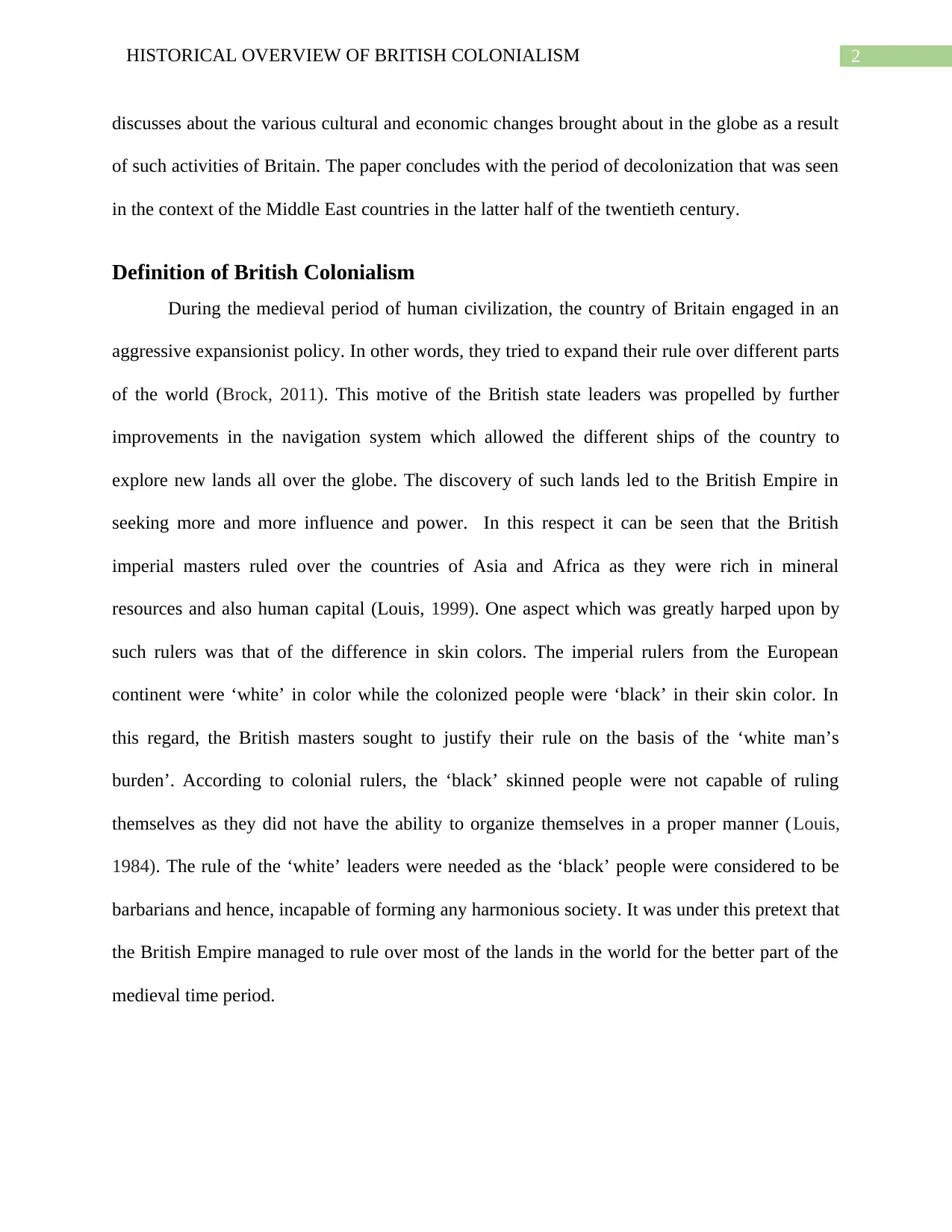
2HISTORICAL OVERVIEW OF BRITISH COLONIALISM
discusses about the various cultural and economic changes brought about in the globe as a result
of such activities of Britain. The paper concludes with the period of decolonization that was seen
in the context of the Middle East countries in the latter half of the twentieth century.
Definition of British Colonialism
During the medieval period of human civilization, the country of Britain engaged in an
aggressive expansionist policy. In other words, they tried to expand their rule over different parts
of the world (Brock, 2011). This motive of the British state leaders was propelled by further
improvements in the navigation system which allowed the different ships of the country to
explore new lands all over the globe. The discovery of such lands led to the British Empire in
seeking more and more influence and power. In this respect it can be seen that the British
imperial masters ruled over the countries of Asia and Africa as they were rich in mineral
resources and also human capital (Louis, 1999). One aspect which was greatly harped upon by
such rulers was that of the difference in skin colors. The imperial rulers from the European
continent were ‘white’ in color while the colonized people were ‘black’ in their skin color. In
this regard, the British masters sought to justify their rule on the basis of the ‘white man’s
burden’. According to colonial rulers, the ‘black’ skinned people were not capable of ruling
themselves as they did not have the ability to organize themselves in a proper manner (Louis,
1984). The rule of the ‘white’ leaders were needed as the ‘black’ people were considered to be
barbarians and hence, incapable of forming any harmonious society. It was under this pretext that
the British Empire managed to rule over most of the lands in the world for the better part of the
medieval time period.
discusses about the various cultural and economic changes brought about in the globe as a result
of such activities of Britain. The paper concludes with the period of decolonization that was seen
in the context of the Middle East countries in the latter half of the twentieth century.
Definition of British Colonialism
During the medieval period of human civilization, the country of Britain engaged in an
aggressive expansionist policy. In other words, they tried to expand their rule over different parts
of the world (Brock, 2011). This motive of the British state leaders was propelled by further
improvements in the navigation system which allowed the different ships of the country to
explore new lands all over the globe. The discovery of such lands led to the British Empire in
seeking more and more influence and power. In this respect it can be seen that the British
imperial masters ruled over the countries of Asia and Africa as they were rich in mineral
resources and also human capital (Louis, 1999). One aspect which was greatly harped upon by
such rulers was that of the difference in skin colors. The imperial rulers from the European
continent were ‘white’ in color while the colonized people were ‘black’ in their skin color. In
this regard, the British masters sought to justify their rule on the basis of the ‘white man’s
burden’. According to colonial rulers, the ‘black’ skinned people were not capable of ruling
themselves as they did not have the ability to organize themselves in a proper manner (Louis,
1984). The rule of the ‘white’ leaders were needed as the ‘black’ people were considered to be
barbarians and hence, incapable of forming any harmonious society. It was under this pretext that
the British Empire managed to rule over most of the lands in the world for the better part of the
medieval time period.
⊘ This is a preview!⊘
Do you want full access?
Subscribe today to unlock all pages.

Trusted by 1+ million students worldwide
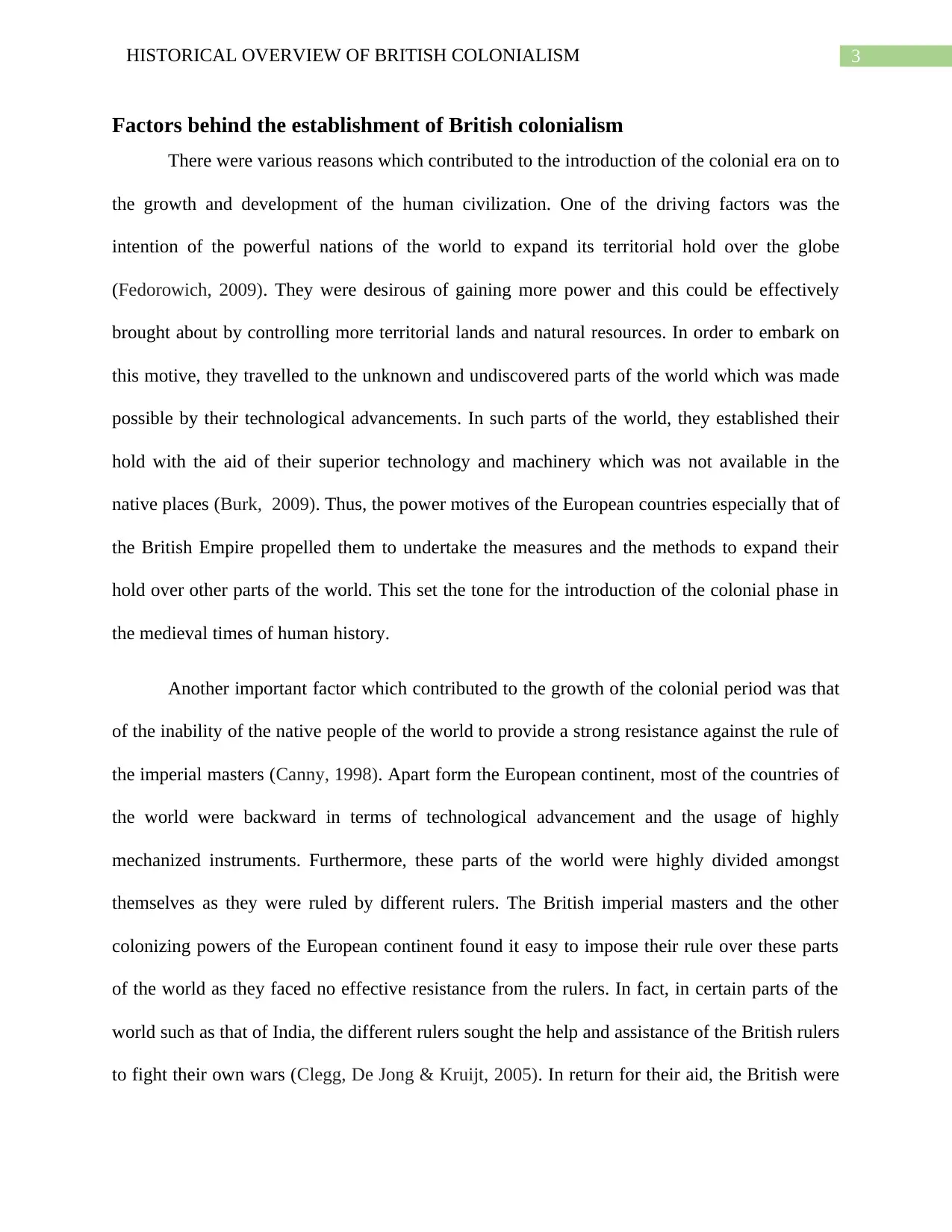
3HISTORICAL OVERVIEW OF BRITISH COLONIALISM
Factors behind the establishment of British colonialism
There were various reasons which contributed to the introduction of the colonial era on to
the growth and development of the human civilization. One of the driving factors was the
intention of the powerful nations of the world to expand its territorial hold over the globe
(Fedorowich, 2009). They were desirous of gaining more power and this could be effectively
brought about by controlling more territorial lands and natural resources. In order to embark on
this motive, they travelled to the unknown and undiscovered parts of the world which was made
possible by their technological advancements. In such parts of the world, they established their
hold with the aid of their superior technology and machinery which was not available in the
native places (Burk, 2009). Thus, the power motives of the European countries especially that of
the British Empire propelled them to undertake the measures and the methods to expand their
hold over other parts of the world. This set the tone for the introduction of the colonial phase in
the medieval times of human history.
Another important factor which contributed to the growth of the colonial period was that
of the inability of the native people of the world to provide a strong resistance against the rule of
the imperial masters (Canny, 1998). Apart form the European continent, most of the countries of
the world were backward in terms of technological advancement and the usage of highly
mechanized instruments. Furthermore, these parts of the world were highly divided amongst
themselves as they were ruled by different rulers. The British imperial masters and the other
colonizing powers of the European continent found it easy to impose their rule over these parts
of the world as they faced no effective resistance from the rulers. In fact, in certain parts of the
world such as that of India, the different rulers sought the help and assistance of the British rulers
to fight their own wars (Clegg, De Jong & Kruijt, 2005). In return for their aid, the British were
Factors behind the establishment of British colonialism
There were various reasons which contributed to the introduction of the colonial era on to
the growth and development of the human civilization. One of the driving factors was the
intention of the powerful nations of the world to expand its territorial hold over the globe
(Fedorowich, 2009). They were desirous of gaining more power and this could be effectively
brought about by controlling more territorial lands and natural resources. In order to embark on
this motive, they travelled to the unknown and undiscovered parts of the world which was made
possible by their technological advancements. In such parts of the world, they established their
hold with the aid of their superior technology and machinery which was not available in the
native places (Burk, 2009). Thus, the power motives of the European countries especially that of
the British Empire propelled them to undertake the measures and the methods to expand their
hold over other parts of the world. This set the tone for the introduction of the colonial phase in
the medieval times of human history.
Another important factor which contributed to the growth of the colonial period was that
of the inability of the native people of the world to provide a strong resistance against the rule of
the imperial masters (Canny, 1998). Apart form the European continent, most of the countries of
the world were backward in terms of technological advancement and the usage of highly
mechanized instruments. Furthermore, these parts of the world were highly divided amongst
themselves as they were ruled by different rulers. The British imperial masters and the other
colonizing powers of the European continent found it easy to impose their rule over these parts
of the world as they faced no effective resistance from the rulers. In fact, in certain parts of the
world such as that of India, the different rulers sought the help and assistance of the British rulers
to fight their own wars (Clegg, De Jong & Kruijt, 2005). In return for their aid, the British were
Paraphrase This Document
Need a fresh take? Get an instant paraphrase of this document with our AI Paraphraser
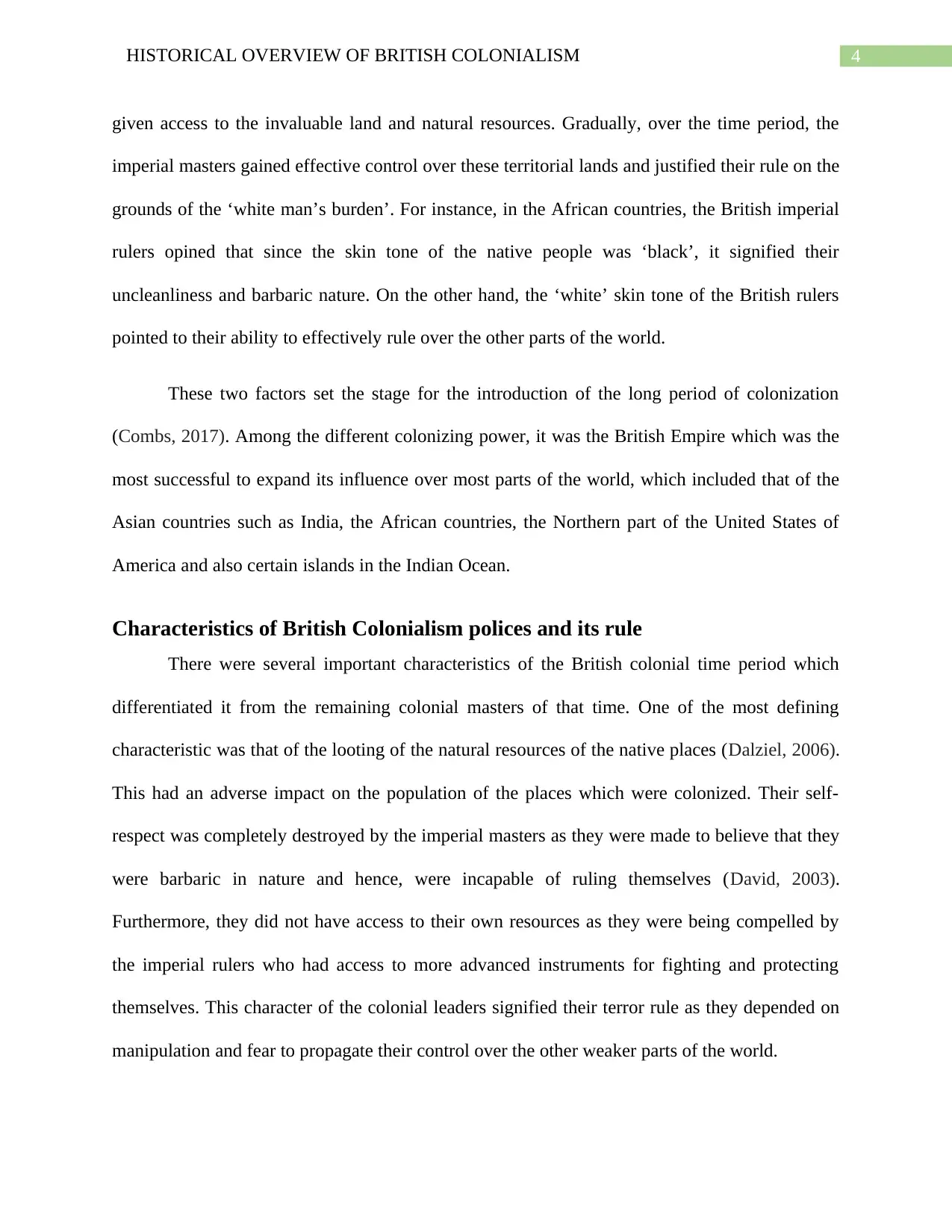
4HISTORICAL OVERVIEW OF BRITISH COLONIALISM
given access to the invaluable land and natural resources. Gradually, over the time period, the
imperial masters gained effective control over these territorial lands and justified their rule on the
grounds of the ‘white man’s burden’. For instance, in the African countries, the British imperial
rulers opined that since the skin tone of the native people was ‘black’, it signified their
uncleanliness and barbaric nature. On the other hand, the ‘white’ skin tone of the British rulers
pointed to their ability to effectively rule over the other parts of the world.
These two factors set the stage for the introduction of the long period of colonization
(Combs, 2017). Among the different colonizing power, it was the British Empire which was the
most successful to expand its influence over most parts of the world, which included that of the
Asian countries such as India, the African countries, the Northern part of the United States of
America and also certain islands in the Indian Ocean.
Characteristics of British Colonialism polices and its rule
There were several important characteristics of the British colonial time period which
differentiated it from the remaining colonial masters of that time. One of the most defining
characteristic was that of the looting of the natural resources of the native places (Dalziel, 2006).
This had an adverse impact on the population of the places which were colonized. Their self-
respect was completely destroyed by the imperial masters as they were made to believe that they
were barbaric in nature and hence, were incapable of ruling themselves (David, 2003).
Furthermore, they did not have access to their own resources as they were being compelled by
the imperial rulers who had access to more advanced instruments for fighting and protecting
themselves. This character of the colonial leaders signified their terror rule as they depended on
manipulation and fear to propagate their control over the other weaker parts of the world.
given access to the invaluable land and natural resources. Gradually, over the time period, the
imperial masters gained effective control over these territorial lands and justified their rule on the
grounds of the ‘white man’s burden’. For instance, in the African countries, the British imperial
rulers opined that since the skin tone of the native people was ‘black’, it signified their
uncleanliness and barbaric nature. On the other hand, the ‘white’ skin tone of the British rulers
pointed to their ability to effectively rule over the other parts of the world.
These two factors set the stage for the introduction of the long period of colonization
(Combs, 2017). Among the different colonizing power, it was the British Empire which was the
most successful to expand its influence over most parts of the world, which included that of the
Asian countries such as India, the African countries, the Northern part of the United States of
America and also certain islands in the Indian Ocean.
Characteristics of British Colonialism polices and its rule
There were several important characteristics of the British colonial time period which
differentiated it from the remaining colonial masters of that time. One of the most defining
characteristic was that of the looting of the natural resources of the native places (Dalziel, 2006).
This had an adverse impact on the population of the places which were colonized. Their self-
respect was completely destroyed by the imperial masters as they were made to believe that they
were barbaric in nature and hence, were incapable of ruling themselves (David, 2003).
Furthermore, they did not have access to their own resources as they were being compelled by
the imperial rulers who had access to more advanced instruments for fighting and protecting
themselves. This character of the colonial leaders signified their terror rule as they depended on
manipulation and fear to propagate their control over the other weaker parts of the world.
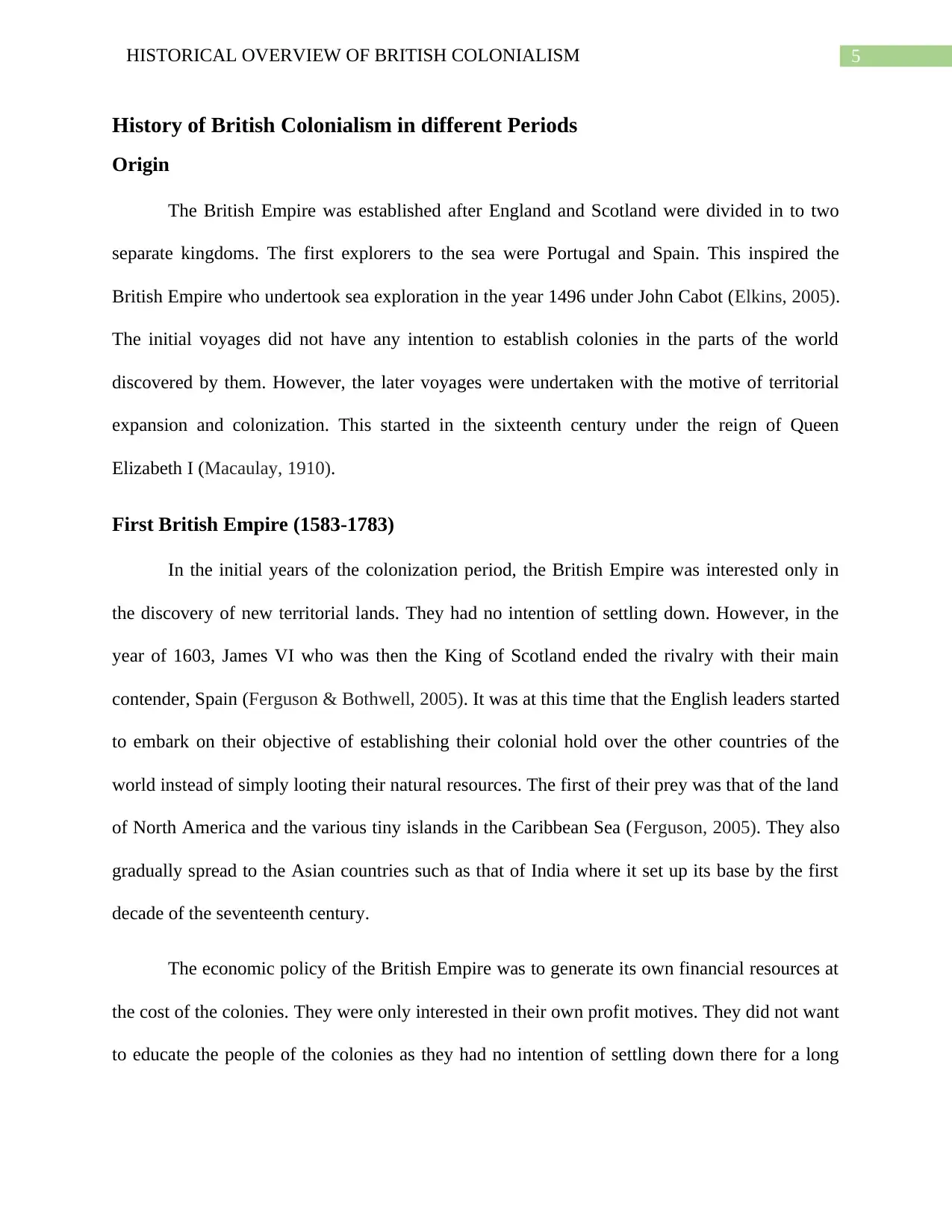
5HISTORICAL OVERVIEW OF BRITISH COLONIALISM
History of British Colonialism in different Periods
Origin
The British Empire was established after England and Scotland were divided in to two
separate kingdoms. The first explorers to the sea were Portugal and Spain. This inspired the
British Empire who undertook sea exploration in the year 1496 under John Cabot (Elkins, 2005).
The initial voyages did not have any intention to establish colonies in the parts of the world
discovered by them. However, the later voyages were undertaken with the motive of territorial
expansion and colonization. This started in the sixteenth century under the reign of Queen
Elizabeth I (Macaulay, 1910).
First British Empire (1583-1783)
In the initial years of the colonization period, the British Empire was interested only in
the discovery of new territorial lands. They had no intention of settling down. However, in the
year of 1603, James VI who was then the King of Scotland ended the rivalry with their main
contender, Spain (Ferguson & Bothwell, 2005). It was at this time that the English leaders started
to embark on their objective of establishing their colonial hold over the other countries of the
world instead of simply looting their natural resources. The first of their prey was that of the land
of North America and the various tiny islands in the Caribbean Sea (Ferguson, 2005). They also
gradually spread to the Asian countries such as that of India where it set up its base by the first
decade of the seventeenth century.
The economic policy of the British Empire was to generate its own financial resources at
the cost of the colonies. They were only interested in their own profit motives. They did not want
to educate the people of the colonies as they had no intention of settling down there for a long
History of British Colonialism in different Periods
Origin
The British Empire was established after England and Scotland were divided in to two
separate kingdoms. The first explorers to the sea were Portugal and Spain. This inspired the
British Empire who undertook sea exploration in the year 1496 under John Cabot (Elkins, 2005).
The initial voyages did not have any intention to establish colonies in the parts of the world
discovered by them. However, the later voyages were undertaken with the motive of territorial
expansion and colonization. This started in the sixteenth century under the reign of Queen
Elizabeth I (Macaulay, 1910).
First British Empire (1583-1783)
In the initial years of the colonization period, the British Empire was interested only in
the discovery of new territorial lands. They had no intention of settling down. However, in the
year of 1603, James VI who was then the King of Scotland ended the rivalry with their main
contender, Spain (Ferguson & Bothwell, 2005). It was at this time that the English leaders started
to embark on their objective of establishing their colonial hold over the other countries of the
world instead of simply looting their natural resources. The first of their prey was that of the land
of North America and the various tiny islands in the Caribbean Sea (Ferguson, 2005). They also
gradually spread to the Asian countries such as that of India where it set up its base by the first
decade of the seventeenth century.
The economic policy of the British Empire was to generate its own financial resources at
the cost of the colonies. They were only interested in their own profit motives. They did not want
to educate the people of the colonies as they had no intention of settling down there for a long
⊘ This is a preview!⊘
Do you want full access?
Subscribe today to unlock all pages.

Trusted by 1+ million students worldwide
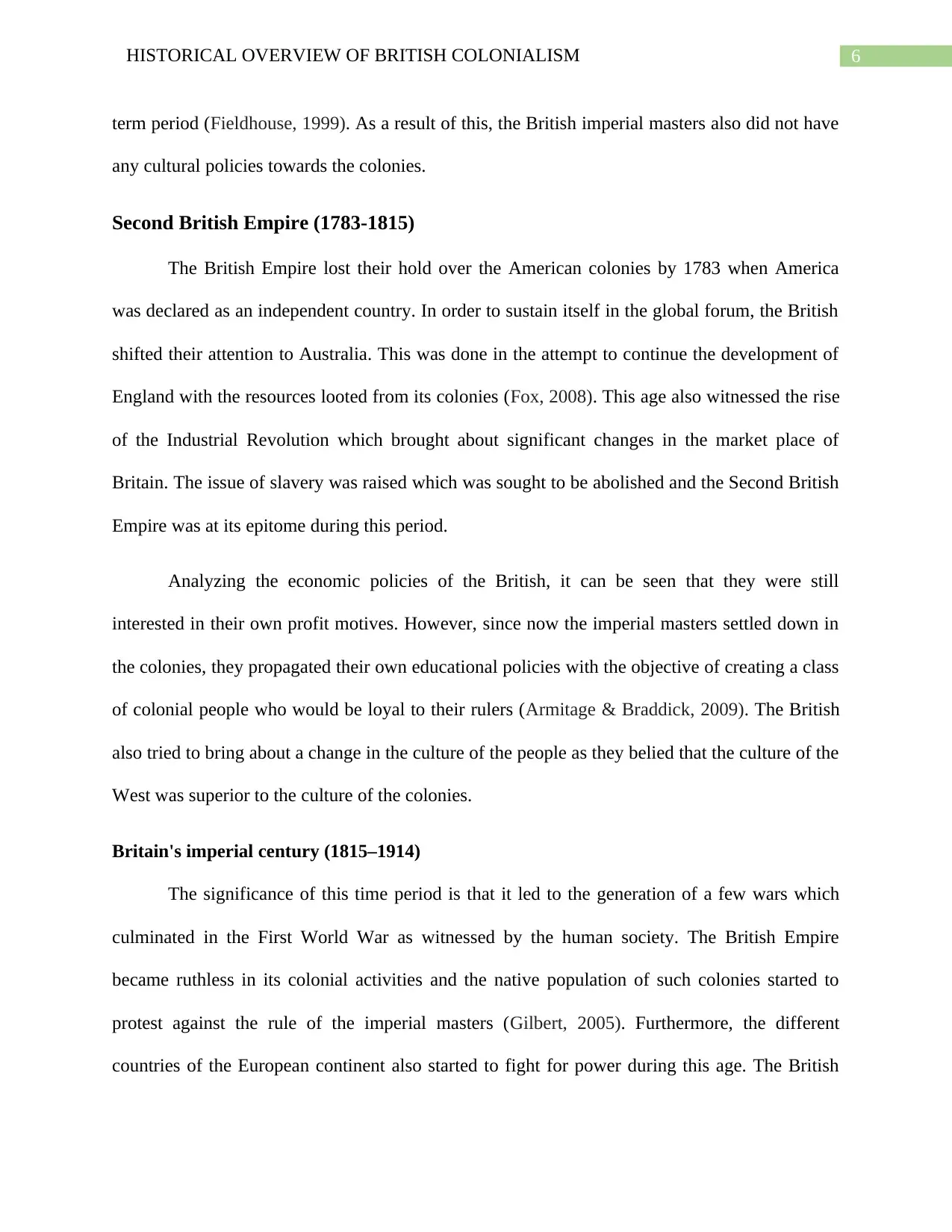
6HISTORICAL OVERVIEW OF BRITISH COLONIALISM
term period (Fieldhouse, 1999). As a result of this, the British imperial masters also did not have
any cultural policies towards the colonies.
Second British Empire (1783-1815)
The British Empire lost their hold over the American colonies by 1783 when America
was declared as an independent country. In order to sustain itself in the global forum, the British
shifted their attention to Australia. This was done in the attempt to continue the development of
England with the resources looted from its colonies (Fox, 2008). This age also witnessed the rise
of the Industrial Revolution which brought about significant changes in the market place of
Britain. The issue of slavery was raised which was sought to be abolished and the Second British
Empire was at its epitome during this period.
Analyzing the economic policies of the British, it can be seen that they were still
interested in their own profit motives. However, since now the imperial masters settled down in
the colonies, they propagated their own educational policies with the objective of creating a class
of colonial people who would be loyal to their rulers (Armitage & Braddick, 2009). The British
also tried to bring about a change in the culture of the people as they belied that the culture of the
West was superior to the culture of the colonies.
Britain's imperial century (1815–1914)
The significance of this time period is that it led to the generation of a few wars which
culminated in the First World War as witnessed by the human society. The British Empire
became ruthless in its colonial activities and the native population of such colonies started to
protest against the rule of the imperial masters (Gilbert, 2005). Furthermore, the different
countries of the European continent also started to fight for power during this age. The British
term period (Fieldhouse, 1999). As a result of this, the British imperial masters also did not have
any cultural policies towards the colonies.
Second British Empire (1783-1815)
The British Empire lost their hold over the American colonies by 1783 when America
was declared as an independent country. In order to sustain itself in the global forum, the British
shifted their attention to Australia. This was done in the attempt to continue the development of
England with the resources looted from its colonies (Fox, 2008). This age also witnessed the rise
of the Industrial Revolution which brought about significant changes in the market place of
Britain. The issue of slavery was raised which was sought to be abolished and the Second British
Empire was at its epitome during this period.
Analyzing the economic policies of the British, it can be seen that they were still
interested in their own profit motives. However, since now the imperial masters settled down in
the colonies, they propagated their own educational policies with the objective of creating a class
of colonial people who would be loyal to their rulers (Armitage & Braddick, 2009). The British
also tried to bring about a change in the culture of the people as they belied that the culture of the
West was superior to the culture of the colonies.
Britain's imperial century (1815–1914)
The significance of this time period is that it led to the generation of a few wars which
culminated in the First World War as witnessed by the human society. The British Empire
became ruthless in its colonial activities and the native population of such colonies started to
protest against the rule of the imperial masters (Gilbert, 2005). Furthermore, the different
countries of the European continent also started to fight for power during this age. The British
Paraphrase This Document
Need a fresh take? Get an instant paraphrase of this document with our AI Paraphraser
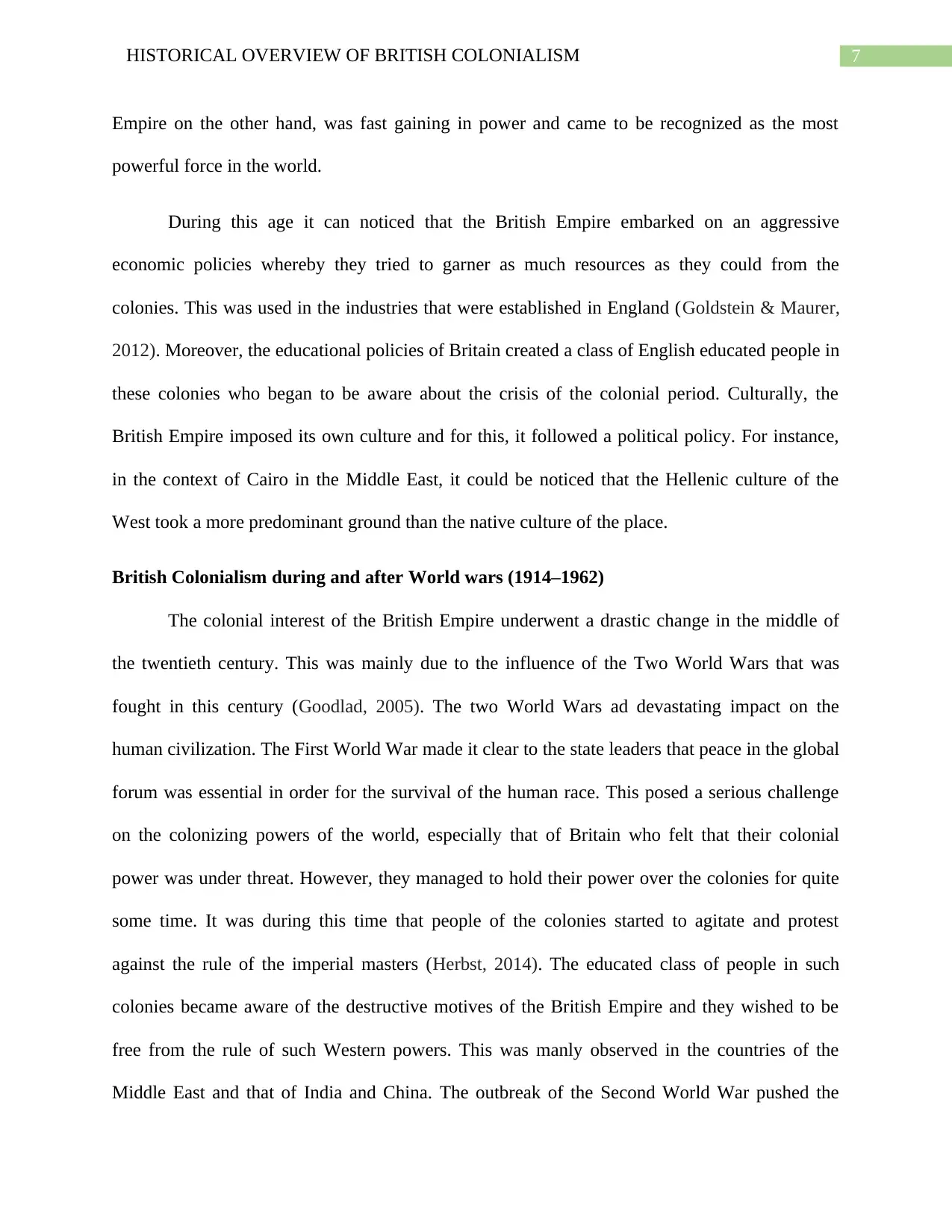
7HISTORICAL OVERVIEW OF BRITISH COLONIALISM
Empire on the other hand, was fast gaining in power and came to be recognized as the most
powerful force in the world.
During this age it can noticed that the British Empire embarked on an aggressive
economic policies whereby they tried to garner as much resources as they could from the
colonies. This was used in the industries that were established in England (Goldstein & Maurer,
2012). Moreover, the educational policies of Britain created a class of English educated people in
these colonies who began to be aware about the crisis of the colonial period. Culturally, the
British Empire imposed its own culture and for this, it followed a political policy. For instance,
in the context of Cairo in the Middle East, it could be noticed that the Hellenic culture of the
West took a more predominant ground than the native culture of the place.
British Colonialism during and after World wars (1914–1962)
The colonial interest of the British Empire underwent a drastic change in the middle of
the twentieth century. This was mainly due to the influence of the Two World Wars that was
fought in this century (Goodlad, 2005). The two World Wars ad devastating impact on the
human civilization. The First World War made it clear to the state leaders that peace in the global
forum was essential in order for the survival of the human race. This posed a serious challenge
on the colonizing powers of the world, especially that of Britain who felt that their colonial
power was under threat. However, they managed to hold their power over the colonies for quite
some time. It was during this time that people of the colonies started to agitate and protest
against the rule of the imperial masters (Herbst, 2014). The educated class of people in such
colonies became aware of the destructive motives of the British Empire and they wished to be
free from the rule of such Western powers. This was manly observed in the countries of the
Middle East and that of India and China. The outbreak of the Second World War pushed the
Empire on the other hand, was fast gaining in power and came to be recognized as the most
powerful force in the world.
During this age it can noticed that the British Empire embarked on an aggressive
economic policies whereby they tried to garner as much resources as they could from the
colonies. This was used in the industries that were established in England (Goldstein & Maurer,
2012). Moreover, the educational policies of Britain created a class of English educated people in
these colonies who began to be aware about the crisis of the colonial period. Culturally, the
British Empire imposed its own culture and for this, it followed a political policy. For instance,
in the context of Cairo in the Middle East, it could be noticed that the Hellenic culture of the
West took a more predominant ground than the native culture of the place.
British Colonialism during and after World wars (1914–1962)
The colonial interest of the British Empire underwent a drastic change in the middle of
the twentieth century. This was mainly due to the influence of the Two World Wars that was
fought in this century (Goodlad, 2005). The two World Wars ad devastating impact on the
human civilization. The First World War made it clear to the state leaders that peace in the global
forum was essential in order for the survival of the human race. This posed a serious challenge
on the colonizing powers of the world, especially that of Britain who felt that their colonial
power was under threat. However, they managed to hold their power over the colonies for quite
some time. It was during this time that people of the colonies started to agitate and protest
against the rule of the imperial masters (Herbst, 2014). The educated class of people in such
colonies became aware of the destructive motives of the British Empire and they wished to be
free from the rule of such Western powers. This was manly observed in the countries of the
Middle East and that of India and China. The outbreak of the Second World War pushed the
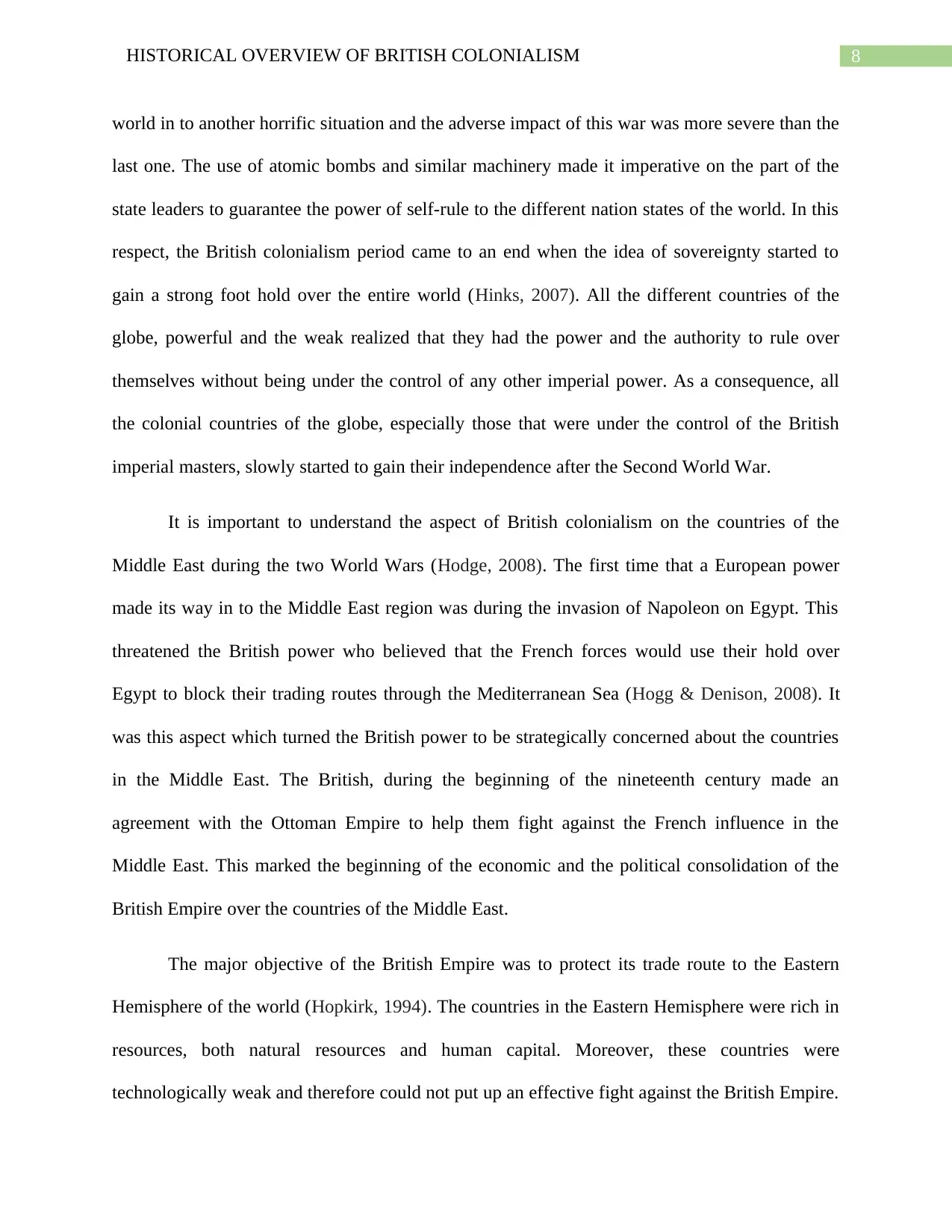
8HISTORICAL OVERVIEW OF BRITISH COLONIALISM
world in to another horrific situation and the adverse impact of this war was more severe than the
last one. The use of atomic bombs and similar machinery made it imperative on the part of the
state leaders to guarantee the power of self-rule to the different nation states of the world. In this
respect, the British colonialism period came to an end when the idea of sovereignty started to
gain a strong foot hold over the entire world (Hinks, 2007). All the different countries of the
globe, powerful and the weak realized that they had the power and the authority to rule over
themselves without being under the control of any other imperial power. As a consequence, all
the colonial countries of the globe, especially those that were under the control of the British
imperial masters, slowly started to gain their independence after the Second World War.
It is important to understand the aspect of British colonialism on the countries of the
Middle East during the two World Wars (Hodge, 2008). The first time that a European power
made its way in to the Middle East region was during the invasion of Napoleon on Egypt. This
threatened the British power who believed that the French forces would use their hold over
Egypt to block their trading routes through the Mediterranean Sea (Hogg & Denison, 2008). It
was this aspect which turned the British power to be strategically concerned about the countries
in the Middle East. The British, during the beginning of the nineteenth century made an
agreement with the Ottoman Empire to help them fight against the French influence in the
Middle East. This marked the beginning of the economic and the political consolidation of the
British Empire over the countries of the Middle East.
The major objective of the British Empire was to protect its trade route to the Eastern
Hemisphere of the world (Hopkirk, 1994). The countries in the Eastern Hemisphere were rich in
resources, both natural resources and human capital. Moreover, these countries were
technologically weak and therefore could not put up an effective fight against the British Empire.
world in to another horrific situation and the adverse impact of this war was more severe than the
last one. The use of atomic bombs and similar machinery made it imperative on the part of the
state leaders to guarantee the power of self-rule to the different nation states of the world. In this
respect, the British colonialism period came to an end when the idea of sovereignty started to
gain a strong foot hold over the entire world (Hinks, 2007). All the different countries of the
globe, powerful and the weak realized that they had the power and the authority to rule over
themselves without being under the control of any other imperial power. As a consequence, all
the colonial countries of the globe, especially those that were under the control of the British
imperial masters, slowly started to gain their independence after the Second World War.
It is important to understand the aspect of British colonialism on the countries of the
Middle East during the two World Wars (Hodge, 2008). The first time that a European power
made its way in to the Middle East region was during the invasion of Napoleon on Egypt. This
threatened the British power who believed that the French forces would use their hold over
Egypt to block their trading routes through the Mediterranean Sea (Hogg & Denison, 2008). It
was this aspect which turned the British power to be strategically concerned about the countries
in the Middle East. The British, during the beginning of the nineteenth century made an
agreement with the Ottoman Empire to help them fight against the French influence in the
Middle East. This marked the beginning of the economic and the political consolidation of the
British Empire over the countries of the Middle East.
The major objective of the British Empire was to protect its trade route to the Eastern
Hemisphere of the world (Hopkirk, 1994). The countries in the Eastern Hemisphere were rich in
resources, both natural resources and human capital. Moreover, these countries were
technologically weak and therefore could not put up an effective fight against the British Empire.
⊘ This is a preview!⊘
Do you want full access?
Subscribe today to unlock all pages.

Trusted by 1+ million students worldwide
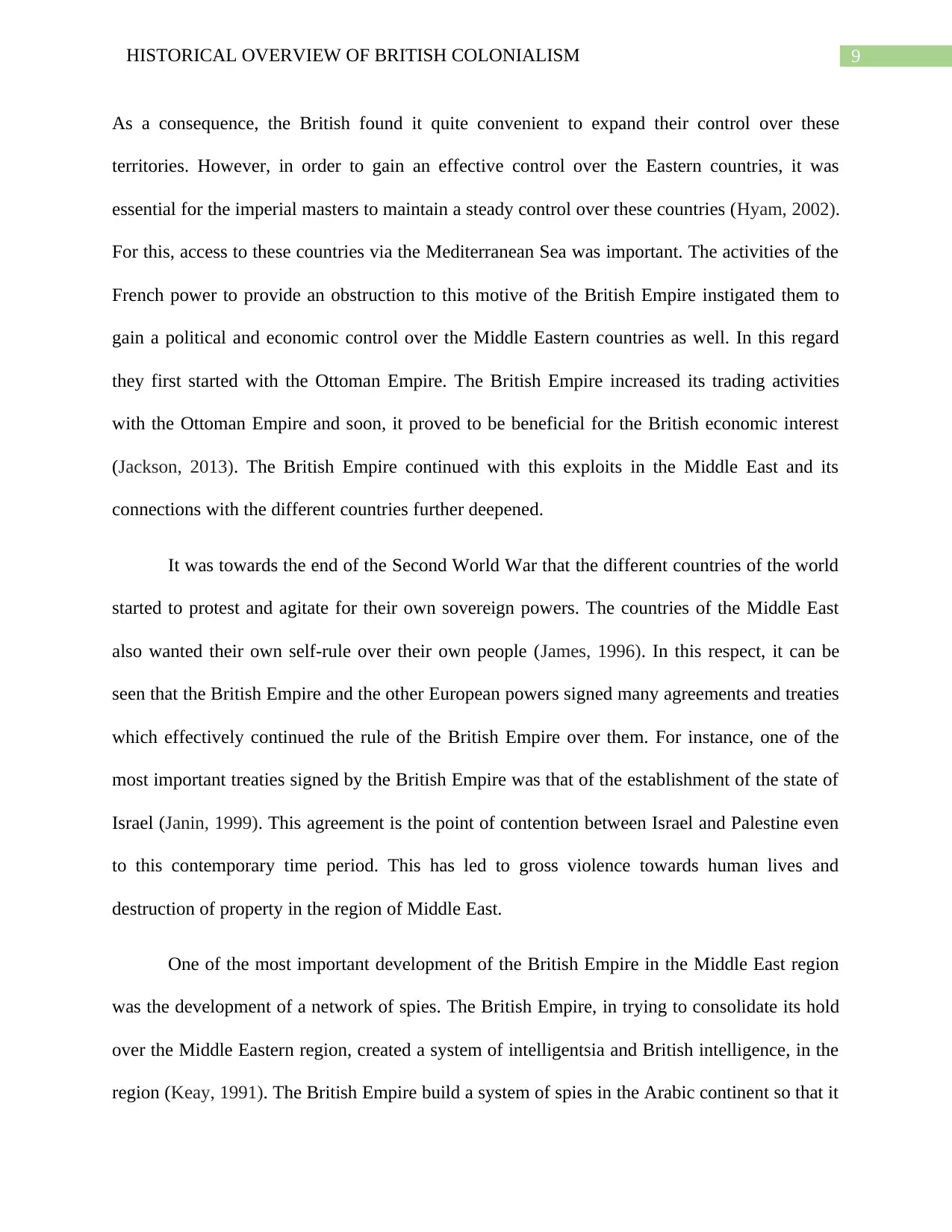
9HISTORICAL OVERVIEW OF BRITISH COLONIALISM
As a consequence, the British found it quite convenient to expand their control over these
territories. However, in order to gain an effective control over the Eastern countries, it was
essential for the imperial masters to maintain a steady control over these countries (Hyam, 2002).
For this, access to these countries via the Mediterranean Sea was important. The activities of the
French power to provide an obstruction to this motive of the British Empire instigated them to
gain a political and economic control over the Middle Eastern countries as well. In this regard
they first started with the Ottoman Empire. The British Empire increased its trading activities
with the Ottoman Empire and soon, it proved to be beneficial for the British economic interest
(Jackson, 2013). The British Empire continued with this exploits in the Middle East and its
connections with the different countries further deepened.
It was towards the end of the Second World War that the different countries of the world
started to protest and agitate for their own sovereign powers. The countries of the Middle East
also wanted their own self-rule over their own people (James, 1996). In this respect, it can be
seen that the British Empire and the other European powers signed many agreements and treaties
which effectively continued the rule of the British Empire over them. For instance, one of the
most important treaties signed by the British Empire was that of the establishment of the state of
Israel (Janin, 1999). This agreement is the point of contention between Israel and Palestine even
to this contemporary time period. This has led to gross violence towards human lives and
destruction of property in the region of Middle East.
One of the most important development of the British Empire in the Middle East region
was the development of a network of spies. The British Empire, in trying to consolidate its hold
over the Middle Eastern region, created a system of intelligentsia and British intelligence, in the
region (Keay, 1991). The British Empire build a system of spies in the Arabic continent so that it
As a consequence, the British found it quite convenient to expand their control over these
territories. However, in order to gain an effective control over the Eastern countries, it was
essential for the imperial masters to maintain a steady control over these countries (Hyam, 2002).
For this, access to these countries via the Mediterranean Sea was important. The activities of the
French power to provide an obstruction to this motive of the British Empire instigated them to
gain a political and economic control over the Middle Eastern countries as well. In this regard
they first started with the Ottoman Empire. The British Empire increased its trading activities
with the Ottoman Empire and soon, it proved to be beneficial for the British economic interest
(Jackson, 2013). The British Empire continued with this exploits in the Middle East and its
connections with the different countries further deepened.
It was towards the end of the Second World War that the different countries of the world
started to protest and agitate for their own sovereign powers. The countries of the Middle East
also wanted their own self-rule over their own people (James, 1996). In this respect, it can be
seen that the British Empire and the other European powers signed many agreements and treaties
which effectively continued the rule of the British Empire over them. For instance, one of the
most important treaties signed by the British Empire was that of the establishment of the state of
Israel (Janin, 1999). This agreement is the point of contention between Israel and Palestine even
to this contemporary time period. This has led to gross violence towards human lives and
destruction of property in the region of Middle East.
One of the most important development of the British Empire in the Middle East region
was the development of a network of spies. The British Empire, in trying to consolidate its hold
over the Middle Eastern region, created a system of intelligentsia and British intelligence, in the
region (Keay, 1991). The British Empire build a system of spies in the Arabic continent so that it
Paraphrase This Document
Need a fresh take? Get an instant paraphrase of this document with our AI Paraphraser
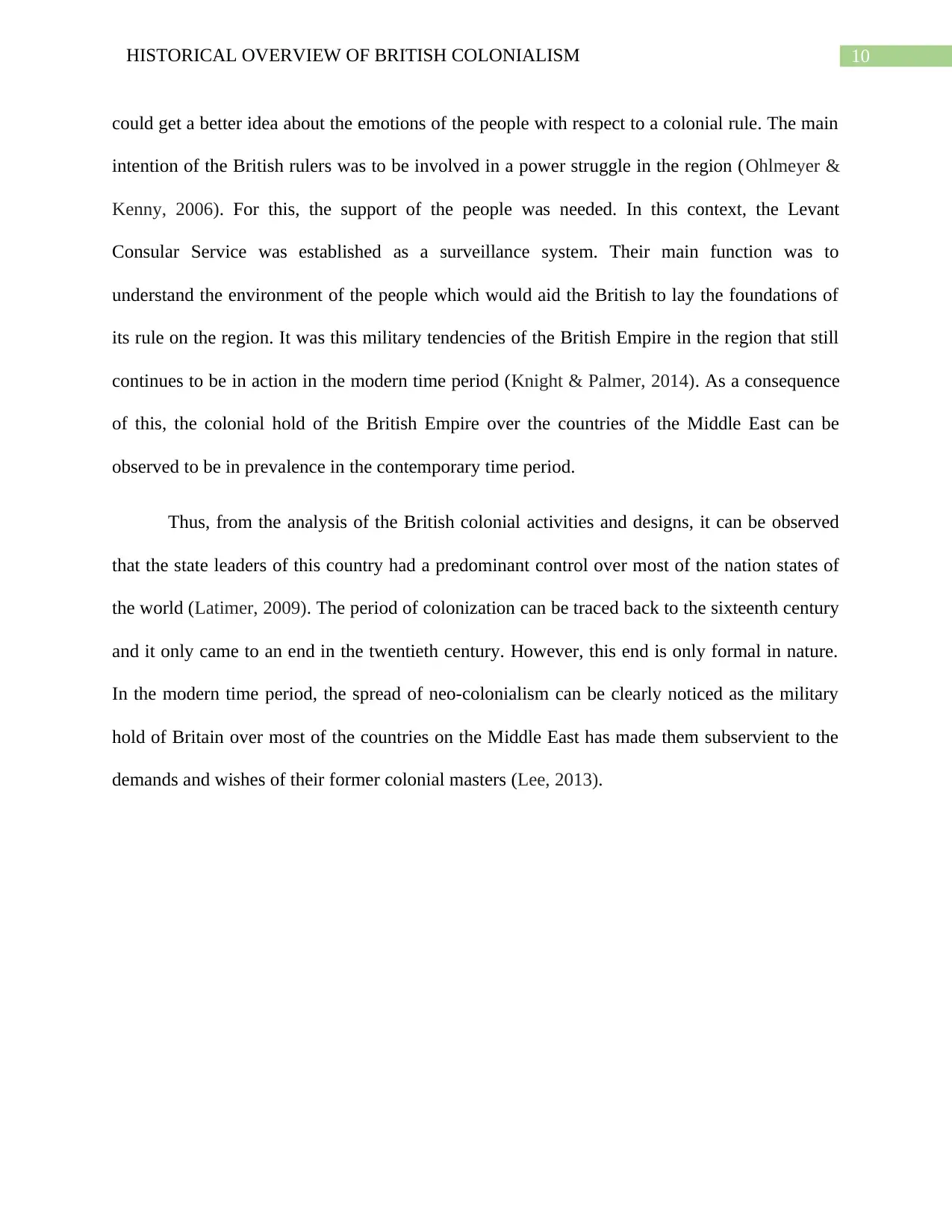
10HISTORICAL OVERVIEW OF BRITISH COLONIALISM
could get a better idea about the emotions of the people with respect to a colonial rule. The main
intention of the British rulers was to be involved in a power struggle in the region (Ohlmeyer &
Kenny, 2006). For this, the support of the people was needed. In this context, the Levant
Consular Service was established as a surveillance system. Their main function was to
understand the environment of the people which would aid the British to lay the foundations of
its rule on the region. It was this military tendencies of the British Empire in the region that still
continues to be in action in the modern time period (Knight & Palmer, 2014). As a consequence
of this, the colonial hold of the British Empire over the countries of the Middle East can be
observed to be in prevalence in the contemporary time period.
Thus, from the analysis of the British colonial activities and designs, it can be observed
that the state leaders of this country had a predominant control over most of the nation states of
the world (Latimer, 2009). The period of colonization can be traced back to the sixteenth century
and it only came to an end in the twentieth century. However, this end is only formal in nature.
In the modern time period, the spread of neo-colonialism can be clearly noticed as the military
hold of Britain over most of the countries on the Middle East has made them subservient to the
demands and wishes of their former colonial masters (Lee, 2013).
could get a better idea about the emotions of the people with respect to a colonial rule. The main
intention of the British rulers was to be involved in a power struggle in the region (Ohlmeyer &
Kenny, 2006). For this, the support of the people was needed. In this context, the Levant
Consular Service was established as a surveillance system. Their main function was to
understand the environment of the people which would aid the British to lay the foundations of
its rule on the region. It was this military tendencies of the British Empire in the region that still
continues to be in action in the modern time period (Knight & Palmer, 2014). As a consequence
of this, the colonial hold of the British Empire over the countries of the Middle East can be
observed to be in prevalence in the contemporary time period.
Thus, from the analysis of the British colonial activities and designs, it can be observed
that the state leaders of this country had a predominant control over most of the nation states of
the world (Latimer, 2009). The period of colonization can be traced back to the sixteenth century
and it only came to an end in the twentieth century. However, this end is only formal in nature.
In the modern time period, the spread of neo-colonialism can be clearly noticed as the military
hold of Britain over most of the countries on the Middle East has made them subservient to the
demands and wishes of their former colonial masters (Lee, 2013).
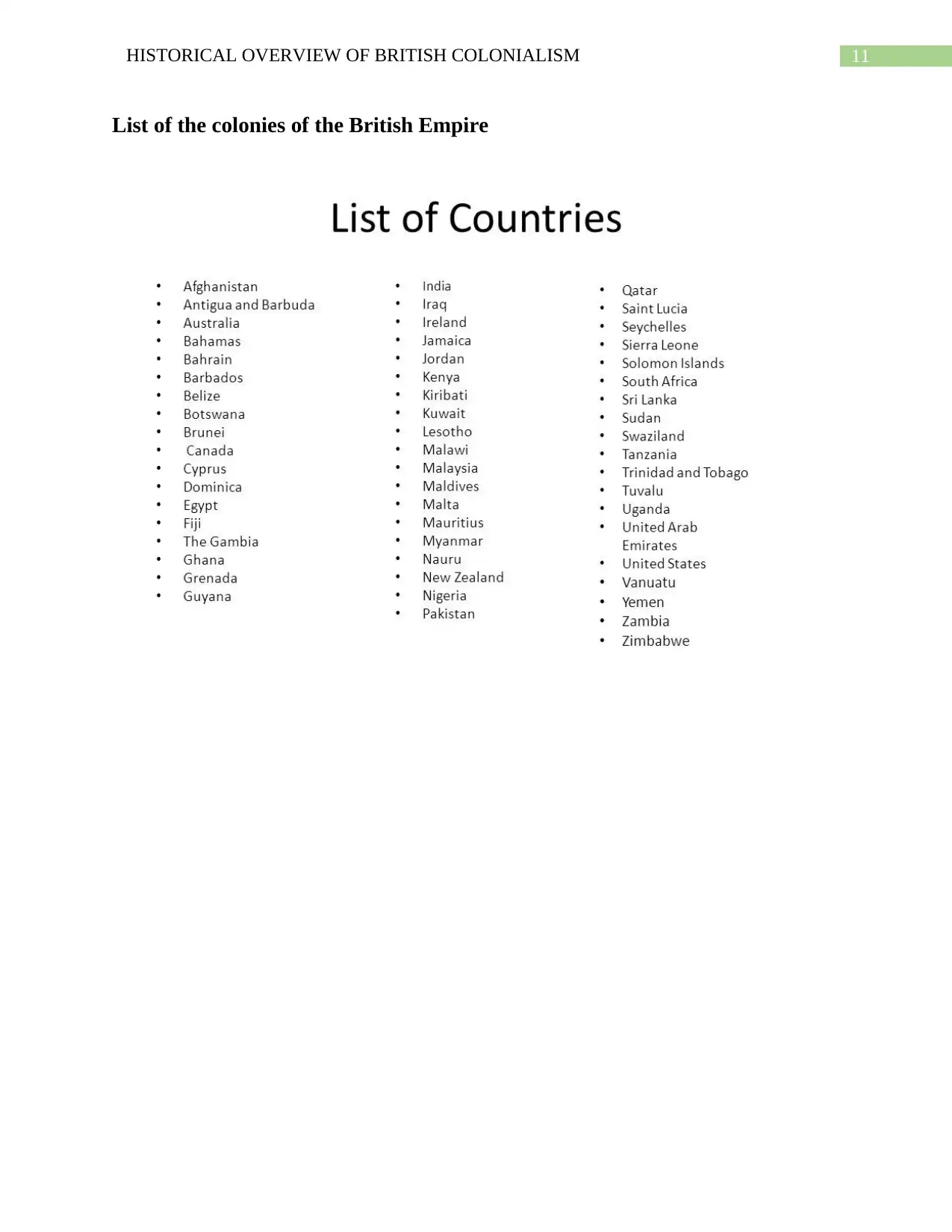
11HISTORICAL OVERVIEW OF BRITISH COLONIALISM
List of the colonies of the British Empire
List of the colonies of the British Empire
⊘ This is a preview!⊘
Do you want full access?
Subscribe today to unlock all pages.

Trusted by 1+ million students worldwide
1 out of 18
Related Documents
Your All-in-One AI-Powered Toolkit for Academic Success.
+13062052269
info@desklib.com
Available 24*7 on WhatsApp / Email
![[object Object]](/_next/static/media/star-bottom.7253800d.svg)
Unlock your academic potential
Copyright © 2020–2026 A2Z Services. All Rights Reserved. Developed and managed by ZUCOL.





